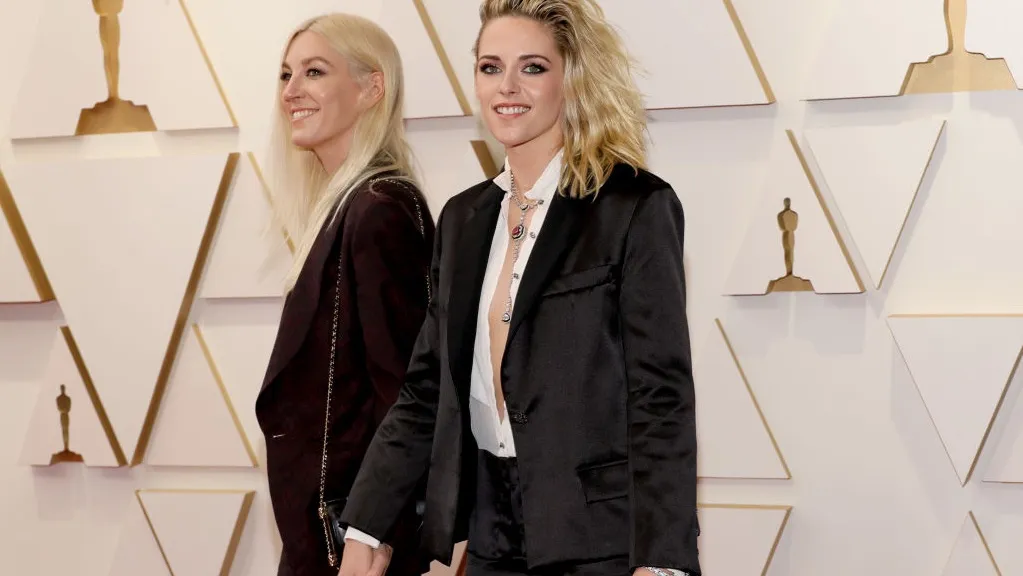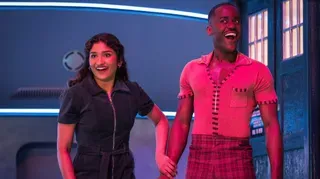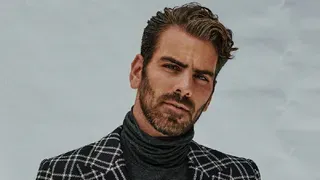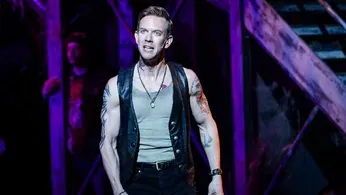
Apr 3
Opera's Vocal Chameleon Edward Nelson Takes on Billy Bigelow in BLO's 'Carousel'
Robert Nesti READ TIME: 9 MIN.
In the Metropolitan Opera's 2023 production of Terence Blanchard's blazing opera "Champion," baritone Edward Nelson made his Met debut in what some might think was a risky turn. Dressed in a denim vest and jeans, and with long blond hair, he's every inch a queer hunk from the early 1970s who would be found in the NYC gay bar where this sequence takes place. Called simply "the man at the bar," he has a sexually charged encounter with the opera's protagonist, Emile Griffith, as they play a cat-and-mouse game of seduction. It was a scene not only seen at the Met, but broadcasted worldwide as part of the MetLive series, giving about a wide an audience as can be imagined for Nelson's debut.
As one of the rising stars in the opera world known for his vocal versatility and dynamic stage presence, Nelson could have waited for a more traditional role in the standard repertory with which to have made his Met debut. But the decision to play this brief, if arresting, role came naturally to the out 34-year-old singer, who, this week and next, is in Boston starring as Billy Bigelow in the Boston Lyric Opera's production of "Carousel." (The production plays the Emerson Colonial Theatre for four performances: April 4 and 6; and April 11 and 13. For more information, follow this link.)
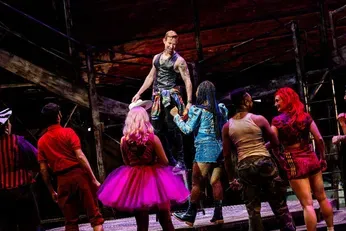
Source: Niles Scott Studios
"I have to chase the opportunities in my career," he explained to EDGE. "And when this 'Champion' role was offered me, I thought: 'Okay, that's my Met debut, and I'm gonna be presenting myself as a gay man on stage.' I realized that comes with risk, because when you make a splash, or when you make an impression in one way, regardless of what that is, it is hard to break that impression. So I took that opportunity, knowing that that was going to be the first time for a lot of people to see me, and it was going to be in that character."
It appears to have paid off: Next season Nelson stars in a history-making role as part the Met's opening night production of "The Amazing Adventures of Kavalier & Clay," composer Mason Bates and librettist Gene Scheer opera based on Michael Chabon's Pulitzer Prize-winning novel. In its Met premiere, Nelson plays actor Tracy Bacon, who has closeted affair with writer Sam Clay during the homophobic 1940s. "It will be the first time in Metropolitan Opera history that two male vocal leads have a romantic narrative arc," Nelson explains. "I'm playing the character who is the lover of Sam Clay, the eponymous Sam Clay. I take opportunities like that."
He also jumped at the opportunity to play Billy Bigelow, "Carousel's" hot-headed protagonist. "I love to play against type, such as someone like Billy Bigelow," he says. 'Here is a role that allows me to use my acting chops and technical skill set to portray a different type of character, at which I'm also adept. I'm very happy to be here with this production, and working on Billy."
Billy Bigelow is one of American musical theater's most troublesome characters – a short-tempered carnival barker who falls in love with a mill worker, Julie Jordan, in late 19th Century coastal Maine. They marry, but, having lost his job, Billy is unprepared to be a good husband to Julie and abuses her. Learning she is pregnant, he turns to crime as a means of supporting her and to restore his self-worth. (Spoiler alert.) But when the robbery fails and Billy is confronted by the police, he kills himself. Then, in a touch of magic realism, he is given the opportunity to come back from the other side to redeem himself; but, once back on Earth, his anger gets the best of him when he meets his 16-year-old daughter, and it takes Julie's love to set things right.
80 years ago the Rodgers and Hammerstein classic had its pre-Broadway run at the Colonial, where the team tinkered with their Americanized version of Hungarian writer Ferenc Molnár's 1909 play "Liliom." They cut characters and scenes, trimming it to an appropriate length before it went onto Broadway success, though one far from that of their record-breaking "Oklahoma!" a few years earlier. And with good reason: As Stephen Sondheim put it, "'Oklahoma!' is about a picnic, 'Carousel' is about life and death." At the time, that theme likely resonated; many were coping with the death of loved ones from the Second World War. In the ensuing decades, its darker themes have been watered down in more traditional and sentimental productions. But the BLO production honors its 80th birthday with a fresh take directed by the visionary director Anne Bogart. In short, this isn't your high school's "Carousel."
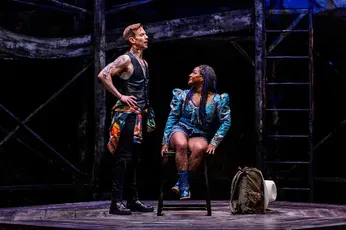
Source: Niles Scott Studios
"I think the BLO is taking quite a few risks with this production," Nelson says. "For instance, every single [one] of the leads is cast against type. Brandie Sutton doesn't play Julie Jordan as a frail waif of the thing Shirley Jones plays her in the movie. Her aunt, Nettie Fowler, is usually played as heteronormative archetype – a sweet sort who has a good time with everyone. But playing it is Jamie Barton, this incredibly strong queer woman, so it will be a different take. The fact that all the leads are cast opposite of type offers, I think, a certain level of risk for those expecting a traditional 'Carousel.'
"To this end," he continues, "is Anne Bogart's decision to set the musical as a play-within-a-play. In her concept, we are a group of travelers who arrive at an abandoned amusement park, and are presenting 'Carousel' to the audience. This gives us, as performers, some distance from these characters. I am Edward Nelson – a contemporary person – playing Billy Bigelow, this 19th century rough guy. I think this concept frees both the performers and the audience from the more traditional and problematic aspects of the piece, and it allows to look at 'Carousel' not in a classical way, but through a modern lens."
Perhaps the biggest problem opera singers face with musical theater roles comes with balancing their singing with acting in a naturalistic way. But Nelson is quite comfortable at moving between the genres. "I jumped at this musical because I have experience with spoken acting, or, for lack of a better term, what the world calls 'straight' theater acting." What he has learned is that singing in musical theater needs to be much closer to his speaking voice. For proof, check out the letter-perfect rendition of Noel Coward's "Mad About the Boy" he did for the San Francisco Opera's Atrium series, where opera singers indulge in more intimate, cabaret performances.
"In opera, you can touch upon all different kinds of colors – big, deep, open colors to express characters," Nelson says. "But the trick with a piece where you speak and sing is that those two voices need to be related for the audience to believe you, and so marrying those two types of vocal delivery is a challenge, and it makes it more difficult because there are very few places to hide. You can't mask yourself with the size of your voice, or the color of your voice, or its sheer magnitude – those Olympic feats of singing over an orchestra without a microphone – those things you can [do] in opera. You are just you connecting to a character through your acting and singing skills, and it is a challenge to bring a human aspect to the performance."
Watch Edward Nelson and Brandie Sutton rehearse a scene from the Boston Lyric Opera production of "Carousel"
Nelson solidified his standing as a rising star in opera when he won the coveted Glyndebourne Opera Cup in 2020. Since then, he has appeared in leading opera houses in America and Europe, showing great range in a variety of roles from the 17th to the 21st century. "I'm always looking for the truest way to present that repertoire. The voice is a very flexible thing, so when I'm singing big, lush, lyric Italian music, I sing it like an Italian opera singer. When I'm singing American – you know, Great American Songbook, or Kurt Weill, or Billy Bigelow – I am singing it in the style in which it was meant to be presented, which is not so operatic, actually. And I am not one that is so married to the idea of 'my sound,' or my specific way of approaching this or that. I am a chameleon. And I'm a chameleon in the repertoire that I sing. I sing Italian bel canto repertoire. I sing French operatic repertoire. I sing, obviously, you know, classic American musicals. And I enjoy this kind of chameleon lifestyle."
The challenge with Billy comes more with the fact that he speaks more than he sings. "I would say at least 85% of this role is spoken, and then, all of a sudden, I have to do this incredibly challenging vocalism, such as at the end of 'Soliloquy.' And that was hard, but I've got it down now. And I came to the realization that the only way for me to refine these moments was to just try and try again. Luckily, we're now getting to the point where we're just running through things, and I feel okay. about it, but at first I was concerned that I didn't sing for 20 minutes or so before the 'Soliloquy,' and then had to deliver this huge vocal scene. I wondered, 'How do I approach that? What's going to help me get there?' And luckily, I feel I have arrived at the solution."
Still, Nelson has faced some pushback for being out in a staunchly conservative art form that clings to outdated stereotypes. He recalls what happened to him some two years ago while appearing in a musical theater piece in Washington, DC where he commented to a fellow actor that he had signed to play Billy Bigelow at the BLO. "And, you know, this hyper-macho Broadway leading man raised his eyebrows and asked, 'Really? You are going to do Billy Bigelow?' That was my first indication that maybe I better look a little more closely at this."
But when he did, he realized such a comment came from familiar (and implicitly homophobic) tropes about masculinity that persist in both arts institutions and the culture at large. "I understood why someone might say that, because it's something that I run into a lot in my career. This idea that because I am a gay person I will be unable to play macho or hyper-masculine characters, whether it's an opera, such as playing Don Giovanni, or someone like Billy Bigelow. I guess they are questioning, in a not-so-subliminally way, a gay person's ability to play a masculine, straight character. And it is not that surprising, because many artists and most arts organizations, especially opera, are very risk averse. So, regardless of whether a singer such as me could play Don Giovanni, which I have done successfully many times now, or Billy Bigelow, which is also going to be a success, most arts organizations are not willing to take that leap with casting a gay person in such a role, because they're not certain that the artist will be able to do that. And that is, I think, the great gift of this project here in Boston, and of the Boston Lyric Opera, who are an incredibly creative organization, who are not afraid to take that risk."
The Boston Lyric Opera's production of Rodgers and Hammerstein's "Carousel" plays the Emerson Colonial Theatre for four performances: April 4 and 6; and April 11 and 13. For more information, follow this link.
Watch Edward Nelson and Ryan Speedo Green in the Metropolitan Opera production of Terence Blanchard's "Champion."
Watch Edward Nelson sing Noel Coward's "Mad About the Boy" as part of the San Francisco Opera's Atrium series.
Robert Nesti can be reached at [email protected].
